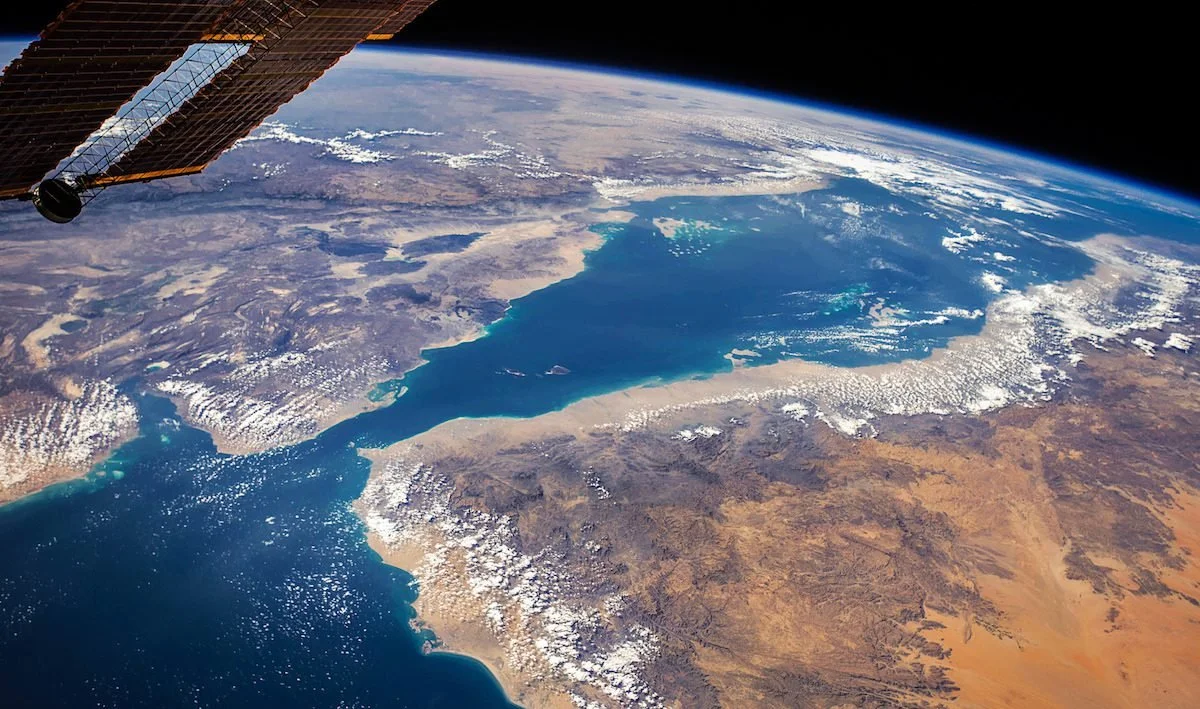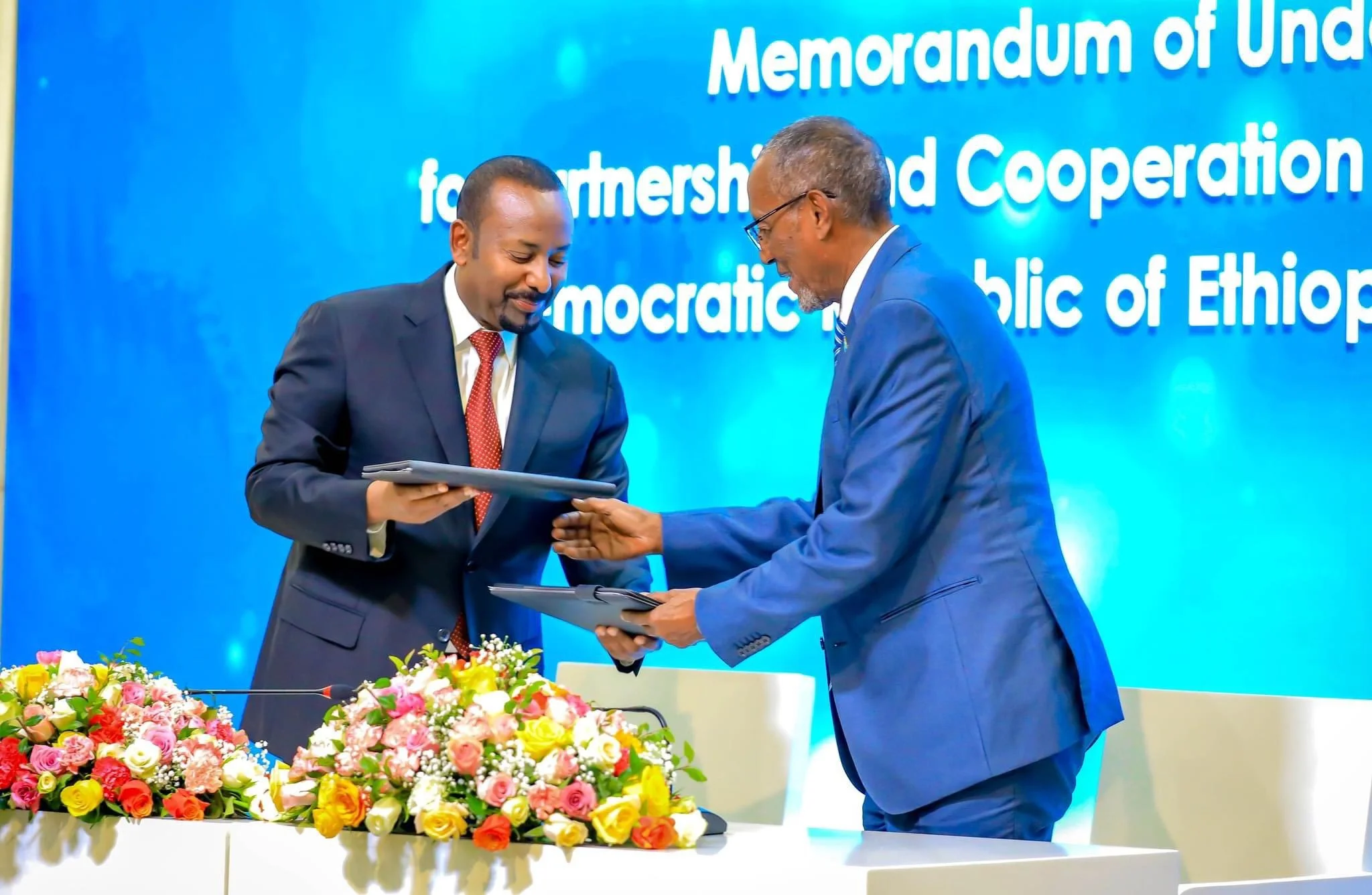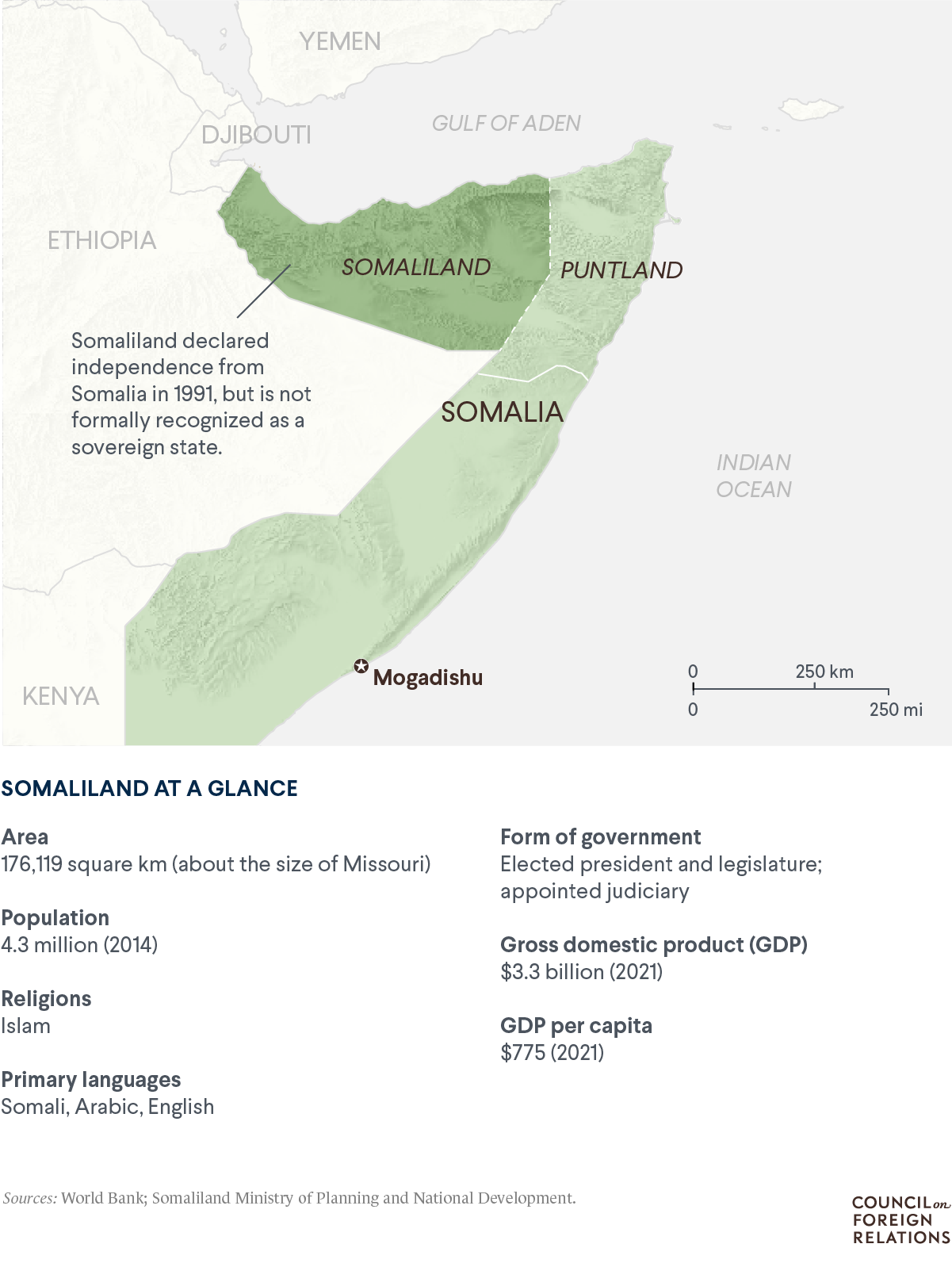Israel’s Hidden Hand: Strategic Interests and the Push for Somaliland’s Recognition
November 21, 2025 - Written by Irshad Nur
Background: A Vortex of Regional Crises and Ambitions
The question of international recognition for the breakaway state of Somaliland has been dramatically transformed. No longer confined to the well-rehearsed arguments of historical distinctness and democratic governance, it has been thrust into the centre of a vortex of intersecting regional crises and bold strategic ambitions. This shift is amplified by influential voices in Washington and a concerted lobbying effort, reframing the issue from a regional dispute into a pivotal matter of the U.S. and Israeli national security. Central to this recalibration is a compelling vision of mutual benefit, drawing direct inspiration from the logic of the Abraham Accords, where economic integration and technological cooperation pave the way for strategic alignment.
The vision was prominently advanced in the 2025 Africa Israel Economic Forum (AIEF), where Somaliland’s potential recognition was discusses as a gateway to a new partnership model. The proposition is one of symbiotic gain: Israel, with its expertise in agricultural technology, water management, and critical infrastructure, is positioned as an ideal partner to help develop Somaliland’s economy. Collaboration on port logistics and security would enhance Berbera’s role as a regional trade hub, potentially creating an efficient supply chain corridor linking the Red Sea to Israeli ports like Eilat, thereby granting Israel deeper access to African markets while securing its western maritime flank. This would simultaneously bolster a key ally, Ethiopia, by enhancing its access to Berbera and reducing its dependency on Djibouti, where Chinese influence looms large. For Somaliland, such cooperation offers a tangible pathway to economic dividends of sovereignty, strengthening its case for recognition through demonstrated development and security gains.
However, this ambitious agenda is propelled by a convergence of critical and highly destabilising developments. Israel, facing an urgent imperative to secure the Bab el-Mandeb Strait against Houthi attacks, identifies a unique strategic opportunity in Somaliland, viewing a friendly government in Berbera as a vital foothold and a permanent counterweight to Iranian influence. This ambition was further catalysed by the Ethiopia-Somaliland MoU, which created a powerful, de facto pro-recognition bloc that Israel, with its deep security ties to Addis Ababa, is uniquely positioned to leverage. Yet, this forward momentum is acutely vulnerable. Somaliland itself faces significant internal fragmentation, with the recent formation of the North Eastern State (SSC-Khatumo) and political unrest in Awdal directly challenging Hargeisa’s authority and territorial integrity. The very act of recognition, pursued for its short-term strategic payoff, risks shattering the fragile state-building project in Somalia, reigniting regional conflicts, and unleashing a cascade of instability that could ultimately undermine the long-term security and economic prosperity it seeks to secure.
The Bab el-Mandeb Strait from space.
Contextual Analysis: Israel’s Deepening Strategic Imperatives
Israel’s renewed and intensified interest in the Horn of Africa is a calculated response to a confluence of direct threats and strategic opportunities. The situation surrounding Somaliland presents a unique convergence of these factors, creating what Israeli strategists view as a necessary and timely intervention.
The Houthi campaign against international shipping in the Red Sea is not merely a symbolic gesture but a potent demonstration of the strategic depth Iran can project through its partners. Launched in explicit response to Israel’s military campaign in Gaza, the attacks serve a dual purpose: to position the Houthis as a decisive force within the "Axis of Resistance" and to impose a tangible economic and strategic cost on Israel and its international backers. According to data from the U.S. Energy Information Administration, about 12% of global seaborne-traded oil and 8% of liquefied natural gas (LNG) passed through the Bab el-Mandeb Strait in the first half of 2023. The Houthi's ability to disrupt this artery was starkly illustrated by a 40% year-on-year decline in Suez Canal revenues for Egypt in January 2024. The Houthi campaign has inflicted a severe economic toll on Israel, with the Finance Ministry reporting an 85 per cent decline in activity at the southern port of Eilat—a vital corridor for Asian trade as shipping is rerouted around the Cape of Good Hope. Israeli strategists view this direct economic and security challenge as a key component of a broader threat; a 2024 analysis by the Institute for National Security Studies (INSS) explicitly linked the Houthi attacks to Iran's strategy of "strategic encirclement," aimed at pressuring Israel across multiple fronts.
In this context, the coast of Somaliland, particularly the port of Berbera which overlooks the southern approach to the Bab el-Mandeb, becomes an increasingly critical strategic consideration for Israel. This calculation is heavily influenced by the shifting alignments on the opposing coastline. Analysis indicates a consistent pattern of cooperation between the Eritrean government and Iran. This partnership has included hosting Iranian military assets, such as the vessel MV Saviz in Eritrean waters from 2016 to 2020, and more recently, the November 2024 detention of three Azerbaijani ships. This action, which occurred without any prior bilateral dispute, is widely interpreted within a regional context where Azerbaijan's close alliance with Israel makes it a target for Iranian pressure—applied here through its Eritrean partner. With the Eritrean coastline effectively aligned with Tehran, the prospect of a friendly and recognised government in Berbera presents Israel with a strategic imperative. A foothold there would offer a durable solution to maritime security challenges, providing a vital base for enhanced domain awareness, intelligence gathering, and a strategic counterweight to secure its shipping interests in an increasingly contested waterway.
Beyond general maritime security, there is compelling strategic logic for Israel to seek a dedicated military installation in the region. This ambition, however, is not pursued in isolation but is increasingly advanced through a strategic partnership with the UAE. This collaboration provides Israel with a capable regional partner with established infrastructure and influence, effectively acting as a force multiplier. The model for this UAE-Israel security cooperation is already operational and extends beyond a single facility into a deeply integrated regional network. The two nations have fast-tracked the development of a joint military base on the Yemeni island of Socotra. This facility, strategically positioned at the entrance to the Gulf of Aden, serves as a critical intelligence and logistics hub. The partnership is operationalised through the presence of Israeli officers on the ground and the deployment of advanced Israeli radar systems and other military apparatus, which significantly enhance the capability to monitor and thwart attacks launched by the Houthis. As analysis from the Washington Institute for Near East Policy notes, such "multilateral air-defence coalitions have become key to the post-October 7 Middle East defence landscape, with countries sharing radar, intelligence and early warning systems." This "open secret" of a joint Emirati-Israeli base and its associated networks establishes a clear and powerful precedent for their willingness to collaborate on advanced military and intelligence installations outside the framework of recognised central governments. Furthermore, this partnership extends directly into Somali territory, deliberately bypassing the Federal Government of Somalia (FGS). Reports detail how the UAE has facilitated the deployment of advanced Israeli radar systems in Bosaso, the commercial capital of the Puntland regional state. This move exemplifies a concerted strategy by Abu Dhabi and Tel Aviv to engage directly with federal member states and breakaway regions, building influence through security partnerships that marginalise Mogadishu.
Israel’s strategic interest in the Ethiopia-Somaliland Memorandum of Understanding is both profound and pragmatic; it represents a calculated outsourcing of a core national security imperative to a capable regional partner. By endorsing Addis Ababa's quest for sea access, Israel gains a powerful strategic enabler. A recognised Somaliland hosting an Ethiopian naval base would grant Israel the indirect, yet reliable, Red Sea access it requires to counter Houthi threats and monitor Iranian activity, all under the politically viable guise of supporting African development and partnership. This alignment is operationalised through deeply entrenched Ethio-Israeli defence cooperation. Israel’s provision of advanced unmanned aerial vehicles (UAVs), including Orbiter and Skylark models deployed by the Ethiopian National Defence Force, coupled with the training of elite special forces, serves a purpose far beyond general capacity building. It directly underpins Ethiopia’s maritime ambitions by furnishing a credible naval deterrent, delivering the surveillance and strike capability needed to secure a prospective coastal base in Somaliland, and establishing the sophisticated command, control, and intelligence architecture essential for modern naval power projection. In essence, Israel’s role transcends arms sales; it is actively cultivating a proxy force, bolstering Ethiopia's conventional deterrence to alter the regional balance of power, and ensuring its partner possesses the integrated military capacity to secure the very maritime access that serves the intersecting strategic objectives of both nations.
Signing of the Memorandum of Understanding between Ethiopia and Somaliland in 2024.
Lobbying and Diplomatic Advocacy: Curating a Win-Win Narrative
Through targeted advocacy, pro-Israel voices in Washington have deliberately reframed Somaliland’s recognition from a question of self-determination into a pressing U.S.-Israeli strategic imperative. This narrative, advanced by think tanks like the Jewish Institute for National Security of America (JINSA) and the Heritage Foundation and championed by lawmakers such as Senator Ted Cruz, strategically positions Somaliland as a critical bulwark against Iranian-backed Houthi threats in the Bab el-Mandeb. Furthermore, it promotes the potential of a U.S.-Somaliland partnership to counter Chinese influence in the region, with the Heritage Foundation explicitly arguing that a "strong American presence in an independent Somaliland would be a hedge" against the over-reliance on Djibouti. This frames the policy as a cost-effective, "by, with, and through" solution—a doctrine used in U.S. defence policy and military strategy that would secure mutual interests while reducing the direct burden on American forces. While this framing powerfully aligns with immediate security objectives, it presents a pragmatic calculus that may risk underestimating the profound regional destabilisation and long-term diplomatic consequences that such a move could unleash.
Within the U.S. government, the drive for Somaliland’s recognition is championed by a cohort of lawmakers whose advocacy is strategically framed within a conflated context that aligns American national security with Israel’s strategic objectives. Senator Ted Cruz, leveraging his platform on the Senate Foreign Relations Committee, has consistently articulated that recognition presents a "key strategic opportunity" for the U.S. to counter adversarial influence from China and Iran, thereby securing a critical maritime chokepoint. This perspective is echoed in the House by representatives such as Scott Perry, who directly links U.S. security to establishing a formal partnership with Hargeisa. While this coalition effectively positions Somaliland as a straightforward strategic asset in great power competition and Red Sea security, their focus appears to prioritise a geostrategic calculus that may not fully account for the intricate and potentially destabilising ramifications within Somalia and the wider Horn of Africa. The policy push, therefore, can be interpreted as an effort to advance a near-term strategic objective bolstering a friendly presence on a key waterway for the benefit of mutual U.S. and Israeli security interests potentially at the expense of a more comprehensive policy that addresses the profound long-term consequences of altering the region's sovereign boundaries.
The concerted advocacy has now crystallised into formal legislative action with the introduction of the Somaliland Act in the U.S. House of Representatives. Sponsored by Congressman Scott Perry and building upon earlier legislative attempts, the bill represents a significant escalation, seeking to authorise the President to recognise Somaliland as an independent nation and formally invalidate Somali territorial sovereignty. The fact that this initiative has gained sufficient momentum to be considered, with its support base extending to influential figures in the Republican Party, demonstrates how the issue has been elevated from a diplomatic discussion to a tangible policy objective. This legislative push, heavily influenced by the same strategic narrative that prioritises countering Iranian influence and securing the Red Sea, underscores a concerning divergence from a nuanced regional policy.
The political momentum within the U.S. legislature is powerfully complemented by a sophisticated, multi-pronged lobbying campaign orchestrated by the UAE. According to foreign influence filings, the UAE dedicated substantial resources, spending $2.6 million with the strategic communications firm FGS Global to advance its interests in Washington, specifically on issues including "defence cooperation with the U.S." and the "conflict in the Red Sea." Notably, during the same reporting period, FGS Global also received a payment of $225,000 from Somaliland’s own Ministry of Foreign Affairs, creating a clear financial link between the two parties using the same influential firm. This parallel engagement suggests a coordinated effort, whereby the UAE leverages its considerable diplomatic and financial weight to subtly bolster the case for recognition. The campaign's mechanism involves commissioning supportive op-eds and analyses; these have been strategically placed in influential American publications such as The Hill and the Washington Examiner, and have been bolstered by papers from think tanks such as the Middle East Institute, Hudson institute and Atlantic Council. By seeding these prepared narratives into major media outlets and briefing policymakers on shared security concerns, the Emirati lobbying creates a manufactured, yet favourable, ecosystem for the Somaliland cause. This effectively reinforces the congressional push by framing regional stability in a manner that aligns perfectly with its own, and by extension Israel’s, strategic objective to secure the southern Red Sea flank against common threats, presenting a unified front that belies the complex and destabilising realities on the ground.
Why Somaliland’s Recognition Undermines Israeli Strategic Interests
The most immediate casualty of recognising Somaliland would be the fragile but tangible progress made in Somalia over the past decade. This period of relative peace and incremental economic development, painstakingly built with billions of dollars in international aid and sustained by African Union peacekeeping efforts, would be instantly undone. Recognition would not merely create a new state; it would shatter the legitimacy of the Federal Government in Mogadishu, triggering a violent unravelling of the nascent Somali state-building project. The result would not be two stable entities, but a return to a fragmented Somalia, splintered into a patchwork of rival administrations. The assumption that Somaliland itself offers a stable, monolithic partner is increasingly tenuous. The territory’s internal cohesion is being openly contested. The recent formation of the North Eastern Somali Federal State, born from a two-year war with pro-Somalia clans, and rising pro-Somalia sentiment in the Awdal region, reveal a political landscape far more complex and volatile than the recognition narrative acknowledges. Pushing for statehood under these conditions would likely inflame these internal divisions, potentially igniting a new conflict within Somaliland’s borders. For Israel, the strategic calculation is therefore a profound miscalculation.
In this power vacuum, the primary beneficiary would be the terrorist entity Al-Shabaab. The group would swiftly recast its narrative, transforming from an insurgent force into a vanguard of Somali nationalism resisting a foreign-backed partition. This potent fusion of religious extremism and patriotic sentiment would prove a powerful recruitment tool. Critically, this renewed momentum would be supercharged by a pragmatic alliance of convenience with the Houthis in Yemen. As documented by UN reports, the two groups, despite ideological differences, have held meetings to coordinate activities, united by a shared hostility towards the US and Israel. This collaboration is operational, involving the transfer of sophisticated military hardware including drones and potentially surface-to-air missiles from the Houthis to Al-Shabaab. Given that the Houthis are themselves a primary conduit for Iranian arms, this effectively creates a new pipeline for Iranian advanced weaponry to flow directly into the Horn of Africa. For Israel, this represents a profound strategic reversal: a policy intended to secure the Red Sea would instead empower its most dedicated adversaries, providing Al-Shabaab with enhanced capabilities to expand its influence and intensify a regional terrorist threat that directly targets Israeli interests.
Israel’s endorsement of Somaliland’s recognition, particularly through its backing of the Ethiopia-Somaliland MoU, creates a profound strategic paradox that risks severely undermining its own key regional partner. While the MoU is designed to grant Ethiopia coveted sea access, Israel’s support for the secessionist precedent that makes the agreement possible directly challenges the principle of territorial integrity that anchors the multi-ethnic Ethiopian state itself. This contradiction would not be lost on powerful sub-national entities within Ethiopia, such as Oromia and the recently pacified Tigray, who could perceive it as a green light to reinvigorate their own secessionist ambitions. Consequently, the very MoU intended to strengthen Ethiopia could instead unleash centrifugal forces that threaten its internal cohesion, leaving Israel having fostered the destabilisation of its primary partner in the Horn. This would not only cripple a crucial security relationship but also sabotage the long-term regional stability and reliable maritime access that the strategy purports to secure.
Conclusion
For the United States and Israel, the advocacy for Somaliland’s recognition is framed as a strategic masterstroke, offering a cost-effective solution to multiple challenges. Washington is presented with a "by, with, and through" model: a local, pro-Western partner to help secure the vital Bab el-Mandeb Strait against Houthi and Iranian threats, all while countering Chinese influence in Djibouti. For Israel, this partnership delivers a crucial strategic foothold on the Red Sea, enabling enhanced maritime security and intelligence gathering directly opposite Yemen, thereby addressing an urgent national security vulnerability. For Somaliland, this alignment offers the most tangible prize of all: a credible pathway to the international recognition it has sought for over three decades. Backed by a powerful coalition, it anticipates not only sovereignty but also significant economic investment and a cemented role as a key regional strategic hub. The compelling "win-win" narrative surrounding Somaliland recognition is dangerously myopic—built on a short-term, pragmatic calculus that fundamentally misreads the Horn of Africa's fragile political ecosystem. This policy gambit risks triggering a cascade of destabilising consequences that would directly undermine the very security interests Israel purports to advance.
Written by Irshad Nur
Analyst on the Africa Research Desk





